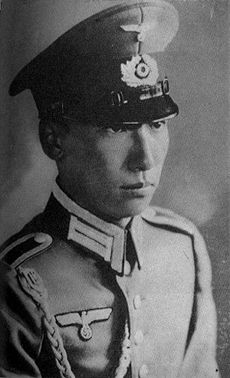- 09 Apr 2009 05:29
#1863553

Bosnjak and Thunderhawk;
About the non Germans wearing German uniforms. Those men are allies to Germany or being trained in Germany.
The Arabs:
An Coup in Iraq shortly overthrown the loyal British government with a national pro-Arab government. Germany sent aid too Iraq to fight off the British.
The Indians:
There was big Indian nationalist movement. The Indian National Army was created to fight the British off the India. They join the Axis to help the Axis remove the British off of India.
Nationalist China:
Before WWII, Germany was giving military training to Nationalist China until Germany signed an alliance with Japan.
Chiang Wei-kuo

He is wearing a military uniform of Germany because he was serving and training on tank tactics in Germany.
http://en.wikipedia.org/wiki/Chiang_Wei-kuo
About the non Germans wearing German uniforms. Those men are allies to Germany or being trained in Germany.
The Arabs:
An Coup in Iraq shortly overthrown the loyal British government with a national pro-Arab government. Germany sent aid too Iraq to fight off the British.
The Indians:
There was big Indian nationalist movement. The Indian National Army was created to fight the British off the India. They join the Axis to help the Axis remove the British off of India.
Nationalist China:
Before WWII, Germany was giving military training to Nationalist China until Germany signed an alliance with Japan.
Chiang Wei-kuo

He is wearing a military uniform of Germany because he was serving and training on tank tactics in Germany.
http://en.wikipedia.org/wiki/Chiang_Wei-kuo










 - By Pants-of-dog
- By Pants-of-dog - By Deutschmania
- By Deutschmania